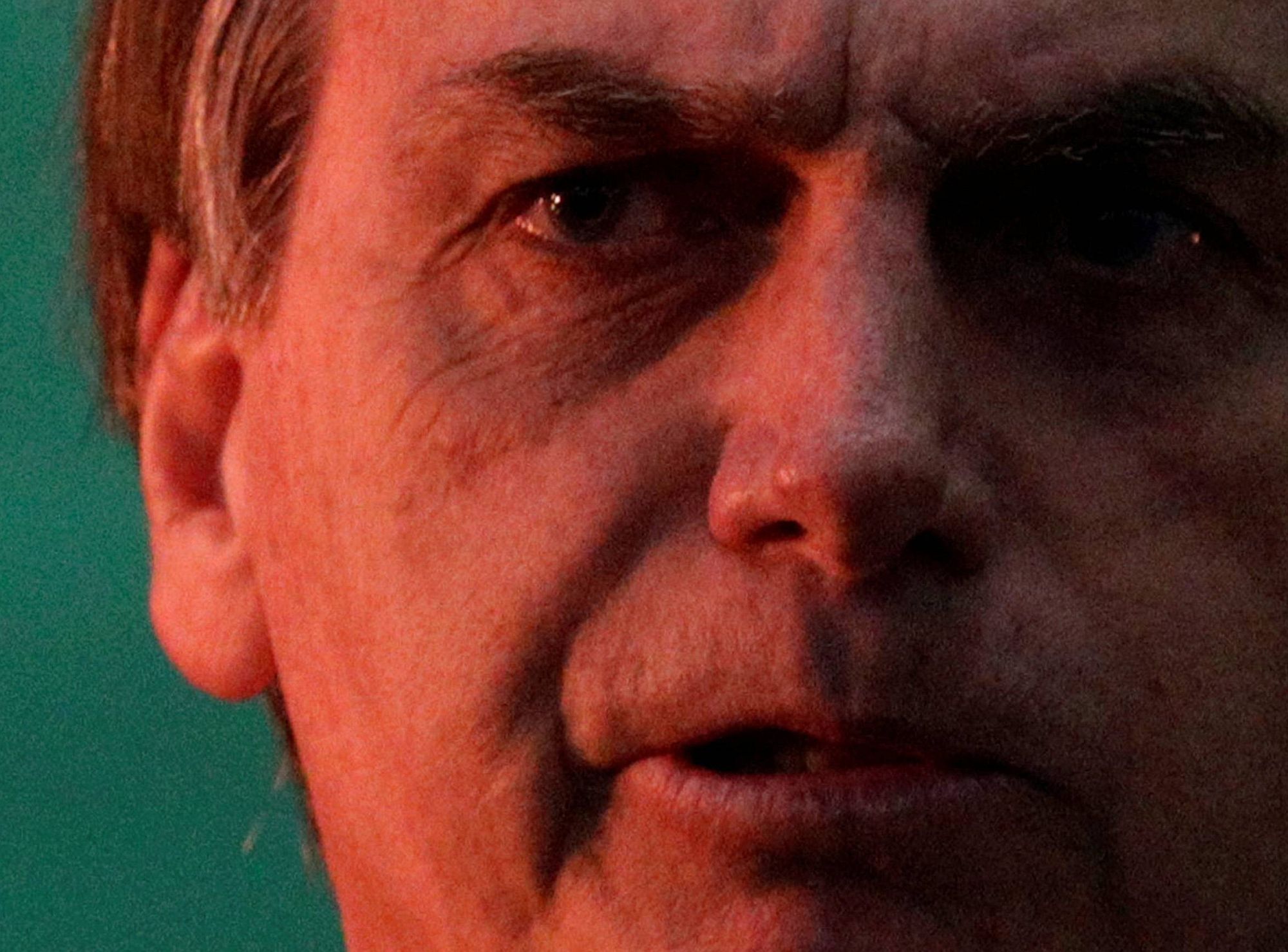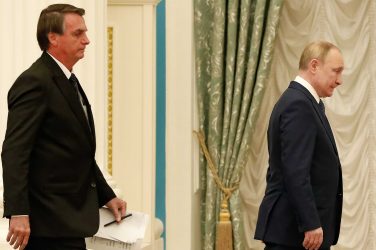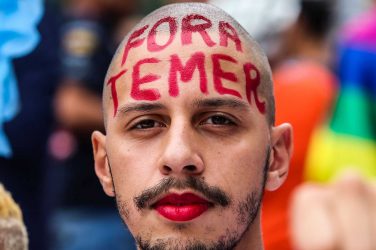In the lead up to Brazil’s election second round, polls show far-right candidate former Brazilian congressman and army captain Jair Bolsonaro from the PSL (Liberal Social Party) with 57 percent of votes, whereas his opponent Fernando Haddad from the Worker’s Party has 43 percent of votes.
But what are the main political factors leading Brazilians to support a former military man, a thuggish apologist of authoritarianism, torture, Human Rights violations and who disregards women’s and LGBT rights?
Brazilians are desperate for change, and far-right candidate Bolsonaro built his political platform on a rhetoric of fear and hate. He argues that Brazil ought to move away from the Workers’ Party “leftist communist ideology,” and that he will lead Brazil “away from ideology.”
Additionally, Bolsonaro argues that under his administration Brazil will no longer pursuit the Workers Party’s “communist agenda,” and prevent Brazil from turning into a “new Venezuela.” His divisive narrative is strongly built in the ultraconservative catholic and anti-communist ideology of Tradition, Family and Property (TFP).
TFP narratives were constructed in 1960’s and used to justify Brazil’s 1964 military coup, which were instrumental to contain communist ideas in cold war times. Bolsonaro claims to be a strong property right’s advocate.
However, there is no evidence that Haddad from the Worker’s Party opposes property rights. The main aim of the Worker’s Party is to address Brazil’s abyssal inequality through social justice policies such as the Bolsa Família, which raised millions of Brazilians out of poverty.
In Brazil, a country where former African slaves never had a fair go, social policies to mitigate huge social contrasts are an absolute priority.
Another pressing question is: how democratic will Brazil be under Bolsonaro’s presidency, and how radical ideology will be removed from his administration? It is important to reflect on Bolsonaro’s far-right ideals to understand how his own ideology might shape Brazil’s political future.
Bolsonaro emerges as an alternative to the Workers’ Party. He argues that under his administration there will be zero tolerance towards corruption. The Workers’ Party Lava Jato and Petrobras corruption scandals, Dilma Rousseff’s impeachment and Lula da Silva’s arrest lead to great political disenchantment in Brazil.
According to recent Datafolha survey, today 16 percent of Brazilians support torture as a means to obtain confessions; 43 percent of Brazilians believe social media content should be controlled; 24 percent of Brazilians do not support citizen’s rights of strikes, 41 percent of Brazilians believe government should intervene in unions, and 33 percent of Brazilians support that some political parties should be banned. Survey results could indicate an increasing authoritarian and anti-democratic sentiment within the Brazilian population.
Far-right candidate Bolsonaro calls himself “incorruptible” and “a fresh start to Brazilian politics.” For instance, Bolsonaro allegedly replied to Geraldo Alckmin from the PSDB (Social Democratic Brazilian Party): “Mr Alckmin, I am still to see anyone like yourself to call me corrupt,” and then stated: “I never received any bribes from the PSDB.” But Bolsonaro is not a fresh face in Brazilian politics: he has been a politician for the past 27 years.
Today, three of Bolsonaro’s four sons are incumbent Brazilian politicians: Eduardo Bolsonaro is a congressman, Flavio Bolsonaro a member of Rio de Janeiro’s Legislative Assembly, and Carlos Bolsonaro serves his fourth mandate as Rio de Janeiro’s city councilor.
It is claimed that Bolsonaro’s has personal assets of 2 million reais (US$ 1 million). By contrast, Worker’s Party Luiz Inácio Lula da Silva has personal assets of 8 million reais (US$ 4 million). It is well known that Bolsonaro did not accept bribes in the mega Petrobras or Lava Jato scandals.
It is also argued that Bolsonaro returned bribes deposited directly into his bank account. This evidence surfaced during the Lava Jato and Petrobras trials, which were widely publicized in the Brazilian media.
It is claimed that former president Lula da Silva had plans if elected to implement media control in Brazil, due to the negative repercussion of the Lava Jato scheme. And these facts were instrumental for the rise of Jair Bolsonaro as Brazil’s new populist leader.
Brazil suffers from creeping recession and staggering crime rates. Bolsonaro’s zero tolerance to crime has a strong appeal to the anxious Brazilian population, who wants quick and short term solutions. To tackle creeping violence, Bolsonaro says he will ease gun laws and reduce criminal responsibility to 16 years old instead of 18 years.
He is a staunch proponent of reactivating the death penalty in Brazil, happily “volunteering to kill those on death row himself.” Moreover, Bolsonaro argues that “with us there will be no human rights protections for criminals” and that “they will die in jail as the government will not provide subsidies to the jail system.”
His political platform calls for the widespread chemical castration of sexual offenders. He also argues that NGO’s and non-profit human rights organizations have paid a disservice to Brazilian society.
An unreconstructed apologist for the military dictatorship that ruled Brazil from 1964 to 1985, Bolsonaro dedicated his vote in favor of Dilma Rousseff’s impeachment process in 2016 in memory of Carlos Alberto Brilhante Ustra. Ustra is a well know perpetrator of atrocities and a notorious torturer of dissenters during the military regime.
Bolsonaro openly stated that his bedside book is Hidden Truth (Verdade Sufocada,), a book written by Ustra. Torture methods used by Ustra are regarded as the most brutal and sadistic, including stripping off prisoner’s clothes and inflicting electric shocks in their genitals until they passed out and bashing up parents in front of their children.
Bolsonaro stated unashamedly that Brazil’s military dictatorship should have been “tougher” and should have killed far more dissenters than it actually did. He suggests that the military regime should have killed “at least 30,000 people instead of only several hundred.”
Additionally, Bolsonaro openly stated that former Brazilian president and sociologist Fernando Henrique Cardoso should have been executed by the military regime. Recently Bolsonaro stated in a threatening tone: that he will “wipe out the country’s red thieves.” In his worldview and ideology, the ends justify the means.
Furthermore, Bolsonaro claims to be a Roman Catholic and his second wife is a Pentecostal. With his ultra conservative tone, Bolsonaro has a strong appeal to the Christian conservative vote and evangelicals in particular.
It is argued that 27 percent of Brazilians today are evangelicals, which could be a game changer in this presidential race. The far-right candidate is an acid critic of the Worker’s Party program Schools without Homophobia, part of the federal government’s project Brazil without Homophobia.
This program would distribute a booklet, videos and pamphlets to equip educators, teachers and civil society in the fight against homophobia in Brazilian schools (nicknamed “kit gay”). Brazil is one of the countries with highest rates of violence towards the LGBT community, with at least 445 LGBT Brazilians being killed in 2017.
It is well known that Bolsonaro mentioned in televised interviews that Schools without Homophobia was an attempt to indoctrinate gender ideology to school children as young as six years old, displaying a sexual education book to the audience (allegedly part of the “kit gay”).
Nevertheless, there is evidence that this was actually fake news. The 2004 Workers’ Party Schools without Homophobia (“kit gay”) was never implemented. In 2011 the material’s distribution was suspended by former Brazilian president Dilma Rousseff from the Workers’ Party.
Additionally, the book showcased by the presidential candidate was 2001’s Swiss Phillipe Chappuis book Aparelho Sexual e Cia (Le guide du zizi sexuel), published in Brazil by publisher Companhia das Letras.
This book was never part of the “kit gay” and was not incorporated in the National Curriculum. Brazil’s Ministry of Education (MEC) and Companhia das Letras have recently released a statement confirming this information.
In Brazil’s culture wars and in an era of fake news, the greatest casualty will be Brazil’s democratic rights and individual freedoms. Once such rights are made relative or removed, it will take generations to rebuilt an independent free press and a robust civil society. If Bolsonaro wins the presidential race this Sunday, it will be a sad day for Brazil’s democratic future.
Flavia Bellieni Zimmermann is a Doctoral Candidate at the University of Western Australia, School of Social Science, Political Science and International Relations. She holds a Graduate Diploma of International Relations and Security Studies from Curtin University, Western Australia, and a Bachelor of Laws with first class honors from the Pontifical Catholic University from Rio de Janeiro (PUC-RJ), Brazil. Flavia is also associated with the University of Western Australia Centre for Muslim States and Societies. She is the Commissioning Editor for the Australian Institute of International Affairs blog The Australian Outlook, voted the top think tank in South Asia and the Pacific in the Global Go-To Think Tanks Index in 2015, 2016 and 2017. Flavia has wide interview experience and has published several opinion pieces in the field of international relations. She is also the Outreach Program Chair for Oceania for the International Association for Political Science Students (IAPSS), with headquarters in Amsterdam, Nederlands.











